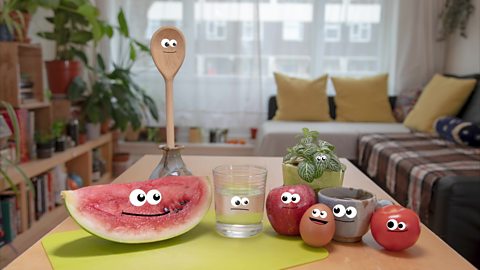In Scotland, we waste around 988,000 tonnes of food and drink every year. Why is that and how can we stop it? Let's find out…
Find out how to reduce food waste with the Great Spoon and friends.
BREAD Stop! Don’t leave me here, please! I’ll go stale!
THE GREAT SPOON Argh humans! They bought too much bread again. They shouldn’t buy so much then it wouldn’t go to waste.
BREAD I wish they’d just wrap me up! I need to be in a cool dark place! It’s way too bright in here! I’ll dry out if they’re not careful…
THE GREAT SPOON Precisely! If they stored you properly you will last longer. They should just freeze you!
BREAD What?!
THE GREAT SPOON You’ll stay fresh for months that way! Think of it as a holiday!
BREAD I suppose that’s not a bad idea, oh Great Spoon. Once defrosted, I’ll be as good as new! Bbbbbrrrrrrrrr! Oooh, I sure… am… chill- Oooh
THE GREAT SPOON Lots of foods can be frozen to keep them fresh: bread, meat, milk, even some fruit and vegetables
CHERRY TOMATO But not us. If you froze us we’d go all mushy. But they shouldn’t just leave us lying out in the sun for ages either. If we were nice and cool in the fridge we’d last longer. Some of us are already past our best, like me. Aaah!
THE GREAT SPOON Food scraps that aren’t safe for people to eat can still feed other things. You can put fruit, vegetables, bread, coffee grounds, egg shells, all sorts of stuff in a compost bin. If you mix it with dead leaves and grass from the garden, it will all break down and release nutrients that can help plants grow. Tomato, you would make great compost!
You too, Banana skin!
CHERRY TOMATO New home! I can’t wait. We’ll have a glorious new life, we’ll help new plants grow - it’s gonna be so beautiful MUFFLED and I'm gonna have so much fun
PLANT Cheers for the nutrients pals!
Why do we waste food?
Many of us buy more than we need, cook more than we are going to eat and don't use up food before it goes out of date.
What is bad about food waste?
- Producing food uses up natural resources like water and energy. This has an impact on climate change.
- In some countries, people go hungry because they do not have enough food.
- We spend a lot of time shopping for food and preparing it into meals.
- Wasting food costs us money.
- Food waste often ends up in landfill. This is harmful for our planet.
Ideas to prevent food waste
- Plan meals – talk about the dinners you would like to have for the week and buy only the ingredients needed.
- Shopping list – take a list to the supermarket and stick to it. Only buy what you need.
- Buy wonky fruit and vegetables – produce that is misshapen often gets left behind in the supermarket. It might look a little different but it tastes just as good!
- Buy short shelf life food – shops have to throw away food when it reaches its 'Use by' date so they sometimes reduce the price to sell it quickly. It can stop waste and save money if you will eat it before it is out of date.
- Store food correctly – wrap and chill cheese. Keep bread in a cool dark place to prevent mould. Do not store highly gaseous produce, like bananas and avocados, with other fruits as they will make them turn bad quicker.
- Freeze - store food in the freezer to keep it fresh and use it later.
- Use all your food up – use what you already have before you go shopping again. You can take leftovers for lunch or make banana bread from overripe bananas that would otherwise go to waste.
- Compost - put fruit and veg scraps in a compost bin where possible.
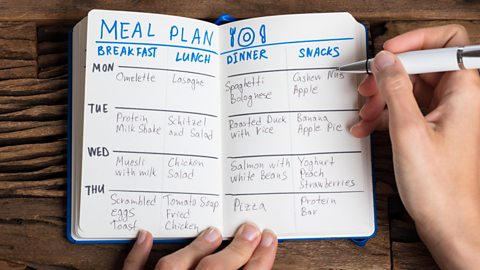
Image caption, Plan your meals
People often buy too much food and some ends up going to waste. Planning ahead means you will only buy the ingredients you need.
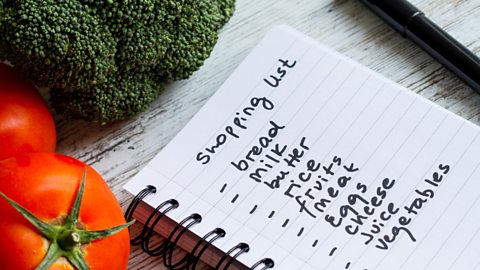
Image caption, Make a shopping list
Making a shopping list and sticking to it means you won't buy food you don't need.
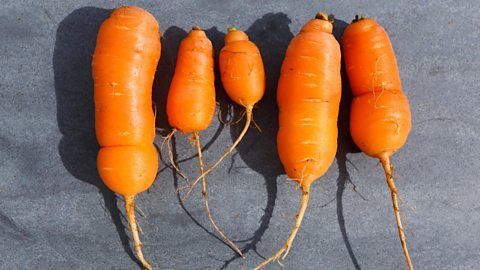
Image caption, Buy wonky
Produce that is misshapen, like these wonky carrots, often gets left behind in the supermarket.
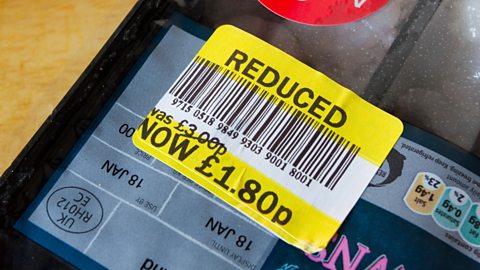
Image caption, Buy short shelf life food
Buying foods which are close to their 'use by' date can help stop waste. These products are often reduced so they're cheaper too!
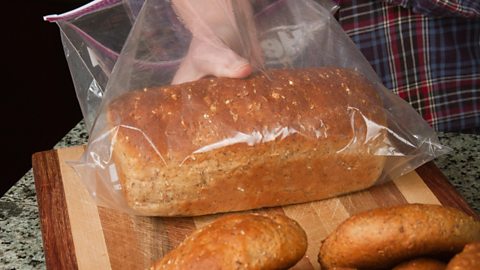
Image caption, Store food correctly
Storing food correctly helps keep it fresher for longer. Bread should be wrapped up and stored in a cool dark place to prevent mould.
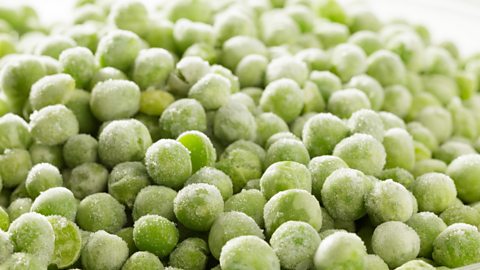
Image caption, Freezing food
Storing food in the freezer will keep it fresh so you can use it later.
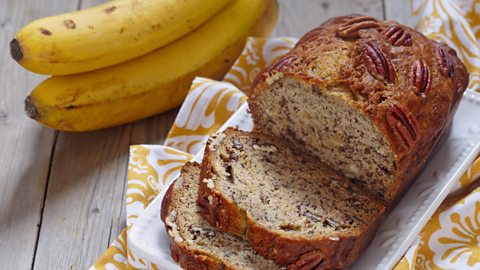
Image caption, Use up food
There are lots of great recipes you can try which use up food that might go to waste. Banana bread is baked using overripe bananas.
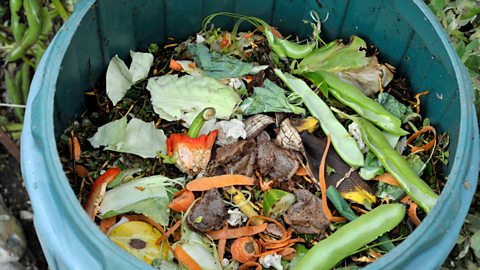
Image caption, Compost
Fruit and vegetables which are already past their best can be put in a compost bin. This turns the food scraps into nutrient rich soil.
1 of 8
What is compost?
Compost is created from organic matterThe waste that comes from living plants and animals that is beginning to breakdown and decay. that breaks down naturally and transforms into nutrient-rich soil. This can occur in a compost heap or bin as long as air can circulate and rainwater can drain away.
What to put in a compost bin
- rotting fruit and vegetables
- grass cuttings
- garden waste, such as dry leaves and sticks
- eggshells
- teabags and coffee grounds
Over time this mixture will decay, and you will be left with compost. This nutrient-rich soil can then be used to grow something new. You could start growing your own food. Easy vegetable options to begin with are lettuce, carrots, and onions.
Food waste such as animal products like meat, fat and dairy should not be put in the compost bin as these foods break down differently.
Test your knowledge
Try this short quiz to test your knowledge of food waste.
Challenge
Look in your kitchen. Are there any food items that might go to waste? Can you find a recipe that puts this food to good use?
Easy recipes for kids
Try using up ingredients in your kitchen with some tasty recipes. Remember to get some help from a grown up.
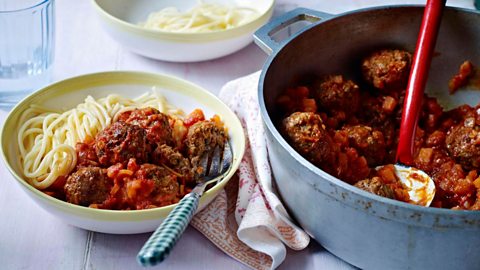
Banana bread recipes
Baking banana bread is a great way to use up overripe bananas that might otherwise go in the bin.
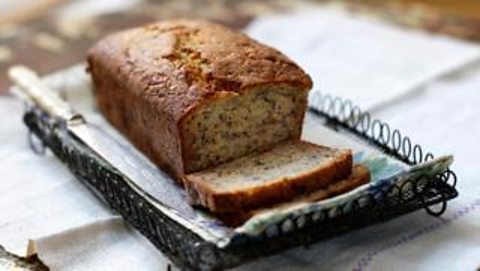
Grow your own fruit and veg. External LinkGrow your own fruit and veg
Easy crops that beginner gardeners can try in pots or a veg patch.
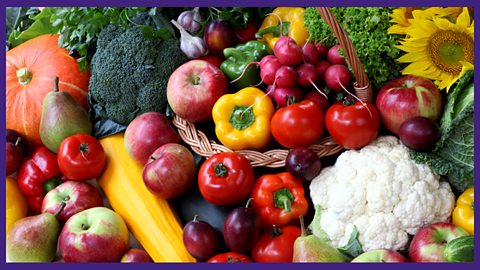
More on Food and health
Find out more by working through a topic
- count10 of 10
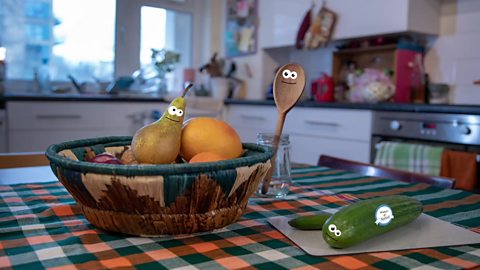
- count1 of 10
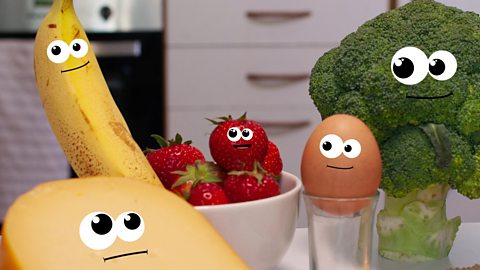
- count2 of 10
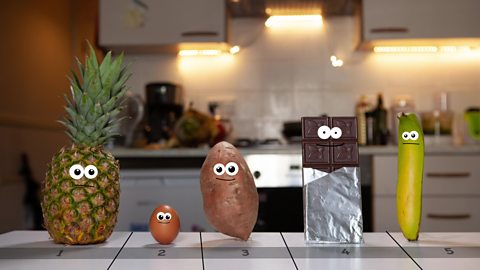
- count3 of 10
